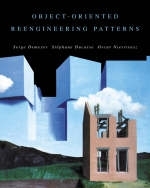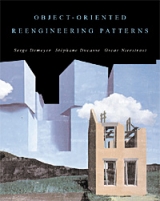
Object-Oriented Reengineering Patterns
Morgan Kaufmann Publishers In (Verlag)
978-1-55860-639-5 (ISBN)
- Titel erscheint in neuer Auflage
- Artikel merken
The documentation is missing or obsolete, and the original developers have departed. Your team has limited understanding of the system, and unit tests are missing for many, if not all, of the components. When you fix a bug in one place, another bug pops up somewhere else in the system. Long rebuild times make any change difficult. All of these are signs of software that is close to the breaking point.Many systems can be upgraded or simply thrown away if they no longer serve their purpose. Legacy software, however, is crucial for operations and needs to be continually available and upgraded. How can you reduce the complexity of a legacy system sufficiently so that it can continue to be used and adapted at acceptable cost?Based on the authors' industrial experiences, this book is a guide on how to reverse engineer legacy systems to understand their problems, and then reengineer those systems to meet new demands. Patterns are used to clarify and explain the process of understanding large code bases, hence transforming them to meet new requirements. The key insight is that the right design and organization of your system is not something that can be evident from the initial requirements alone, but rather as a consequence of understanding how these requirements evolve.
Serge Demeyer is a Professor in the Department of Mathematics and Computer Science at the University of Antwerp in Belgium. He also serves as a technical leader of the FAMOOS esprit project; a project whose goal is to come up with a set of reengineering techniques and tools to support the development of object-oriented frameworks. He has been involved in the organization of several workshops (at ECOOP and ESEC) and one tutorial concerning object-oriented reengineering. Stéphane Ducasse is a post doctoral researcher in the Software Composition Group in Berne, serving as technical leaders of the FAMOOS esprit project; a project whose goal it is to come up with a set of reengineering techniques and tools to support the development of object-oriented frameworks. He has been involved in the organization of several workshops (at ECOOP and ESEC) and one tutorial concerning object-oriented reengineering. Oscar Nierstrasz is a Professor of Computer Science at the University of Berne, where he leads the Software Composition Group. He has been active in the object-oriented research community for many years, serving on program committees of among others, ECOOP, OOPSLA and ESEC. He gave several tutorials and invited talks on object-oriented technology at various international conferences and workshops.
Foreword. Preface. Reengineering Patterns. Part I Reverse Engineering Setting Direction. First Contact. Initial Understanding. Detailed Model Capture. Part II Reengineering Tests: Your Life Insurance! Migration Strategies. Detecting Duplicated Code. Redistribute Responsibilities. Transform Conditionals to Polymorphism. Appendix: Thumbnail Patterns. References. Index.
| Erscheint lt. Verlag | 16.7.2002 |
|---|---|
| Reihe/Serie | The Morgan Kaufmann Series in Software Engineering and Programming |
| Verlagsort | San Francisco |
| Sprache | englisch |
| Maße | 186 x 234 mm |
| Gewicht | 810 g |
| Themenwelt | Informatik ► Software Entwicklung ► Objektorientierung |
| ISBN-10 | 1-55860-639-4 / 1558606394 |
| ISBN-13 | 978-1-55860-639-5 / 9781558606395 |
| Zustand | Neuware |
| Haben Sie eine Frage zum Produkt? |
aus dem Bereich



